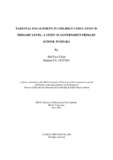Parental engagement in children’s education in primary level: a study in government primary school in Dhaka
Abstract
This study has found that along with teachers’ teaching at schools, parental engagement in children education is an essential way to improve children education since children spend the lion share of their time at homes with parents, and the children whose parents are involved in their learning in any way perform far better than those who have received no parental guidance at homes. This study explored the existing practices of parental engagement in children learning, how parents and teachers consider this, how parents get involved in children learning and the problems and prospects of parental engagement in children learning. The study adopted qualitative research approach and data were collected through interview and focus group discussion. SMC members, HT and assistant teachers were interviewed while parents took part in the FGDs. The study revealed that both teachers and parents acknowledge that parents highly require to have strong connection with their children education. It was also found that there are some communication gaps between the teachers and parents because of some valid reasons like parents’ apathy to children learning, parent’s poor economic condition and their ignorance and teachers disrespect to parents. Besides, it was said that teachers have many supplementary work other than regular teaching in the classroom as teachers have to show up in some local governmental occasions like observing days, and teachers are assigned in various activities of elections which break their attention to teaching. This study also revealed that dropout rates, a major concern for all educators around the globe especially countries like Bangladesh, can easily be reduced if children find their education joyful, smooth and stress less. And this will happen when parents are substantially involved in their children learning and both parents and teachers have respectful and faithful relation to each other for the betterment of children education and overall growth.

